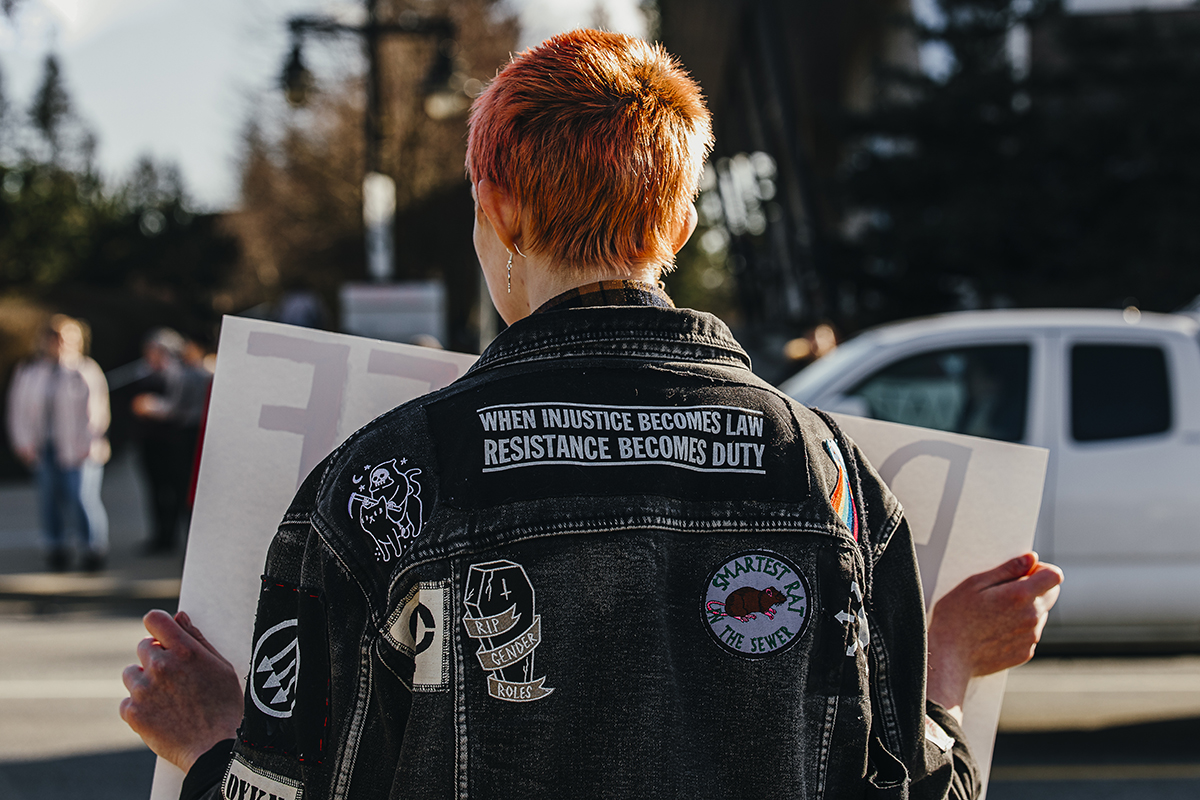Demonstrations in solidarity with the Wet’suwet’en hereditary chiefs who oppose the CGL pipeline across their traditional territory have been the subject of heavy media coverage, and demonstrations are being held not just in major cities like Toronto and Vancouver, but in smaller towns across the country, including Abbotsford. On March 4, UFV students staged a walkout in solidarity with Wet’suwet’en, and last month Abbotsford demonstrators held a march on Feb. 22, and others erected a rail barricade on Feb. 24.
As more people get involved with solidarity and fighting for land rights, it’s important for non-Indigenous demonstrators — especially those organizing solidarity events — to check in with themselves about how they’re interacting with Indigenous people in their communities. Here are some questions settlers should ask themselves before asking an Indigenous person to come to their demonstration:
- Are you asking them to get involved just because they’re Indigenous? If so, why? What assumptions are you making about that person, and Indigenous people in general?
- If they’re already involved in solidarity work, are you sure that they’re not already maxed out on emotional labour, time commitments, or life in general?
- Do you only reach out to this person to ask them to do solidarity work with you?
- Are you being upfront with them about what you expect from them? Are you inviting them to attend your demonstration, or to justify its existence?
- Are you asking them because you think they might want to come, or because you want them to perform being Indigenous? Would you be disappointed if they showed up without a drum, or in jeans instead of regalia?
When organizing a protest, it’s important to lay out (to yourself and others) why you’re organizing a demonstration in the first place, what you hope it will accomplish, and what role you’re willing to take on publically and visibly. If you have been thoughtful, reflexive, and responsible with putting together your event, the presence — and by extension endorsement — of one or two token Indigenous people should not make or break it. An Indigenous person is not an insurance policy against criticism.
The Unist’ot’en camp website links to a zine on allyship by Ancestral Pride which says, “Of course we do not want to be dictated to or told what we should be doing by settlers BUT if you are organizing then you need to make decisions and act on them without being guided every step of the way.” If you don’t want to lead as a settler, reach out to Indigenous people who have already chosen to take on leadership roles and ask if you can get involved with them. But, why do you feel uncomfortable with being visible in the solidarity movement as a settler in the first place?
This sentiment is usually well-intentioned; learning not to speak over people whose rights are at stake in a given moment is one of the first lessons many activists learn. However, if you are getting involved with solidarity work out of concern for Indigenous rights, there is value in letting detractors of Wet’suwet’en solidarity see that it’s not just Indigenous people who are involved, passionate, and taking initiative. You have privilege, but don’t just check it — use it.
At protests against Trump’s separation and incarceration of immigrant families, protestors in the Bay Area in 2018 consistently directed media coverage to the white people in attendance; they hoped that by showing white Americans from typically conservative, politically disengaged locales and demographics were involved it would demonstrate how dire the situation was. Further, at a protest where many of the people with a stake in it were undocumented, white Americans were able to shoulder the burden of risking arrest. At these protests, a group of white protestors trespassed on holding facility grounds and chained themselves in place. According to organizers, later protests, because of those protestors’ visibility, saw an even higher white turnout.
Rather than simply offering approval, offer something material. Instead of helping charitably, seek to join equally. If you find yourself unable to reach (or not invited to) Indigenous-led demonstrations, by all means start your own — but also consider using the privilege you have in the colonial system. Write letters to city councillors, MLAs, and MPs, or consider what powerful institutions you have access to and influence over, like your municipal government, your workplace, your school, or your faith organization. Helping Indigenous land defenders get material resources like food, transportation, or money can be as impactful as — or more than — demonstrating directly. And, if you do decide to invite an Indigenous person to your event, invite them because you want them there as a person, not a token.
Image: Sean Dalin


